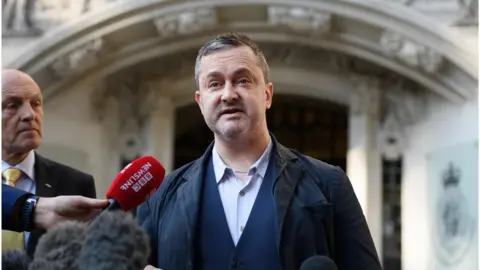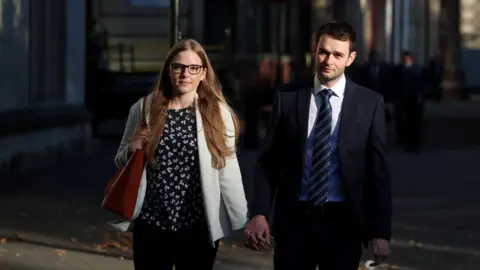Ashers 'gay cake' row referred to European Court
A case involving a Christian bakery, which refused to make a cake with a slogan supporting same-sex marriage, has been referred to the European Court of Human Rights (ECHR).
Gareth Lee tried but failed to order the £36.50 cake at Ashers bakery in Belfast in May 2014.
The company declined the order as it was "at odds" with its beliefs.
Last year, the firm won its appeal at the UK Supreme Court, which ruled its actions were not discriminatory.
Mr Lee's latest legal bid will argue that the Supreme Court "failed to give appropriate weight" to him under the European Convention of Human Rights.
The high-profile dispute began in 2014 when the bakery refused to make a cake with the slogan Support Gay Marriage.
 Getty Images
Getty ImagesMr Lee, a gay rights activist, sued the company for discrimination on the grounds of sexual orientation and political beliefs.
But the bakery has always insisted its objection was to the message on the cake, not the customer.
Ashers lost the initial case which was taken against it and its subsequent appeal, but in October 2018 the firm won an appeal at the Supreme Court.
 Reuters
Reuters'Supreme Court blurred lines'
In a statement, Mr Lee's solicitor said the latest legal bid "does not directly implicate the owners of Ashers bakery or challenge their right to privately hold religious/political views".
"Instead the case will be against the United Kingdom, a member state of the European Court," the statement read.
It added: "The latest hearings will attempt to challenge that ruling at the highest human rights court in Europe, citing the Supreme Court failed to give appropriate weight to Mr Lee's rights under the European Convention of Human Rights.
"The Supreme Court ruling blurred the line, creates legal uncertainty for all of us in Northern Ireland, and the ECHR is the appropriate place to clarify this issue."
Meanwhile, Mr Lee said he would fight for the rights of business owners to hold their own religious beliefs.
"I have my own beliefs. But that's not what my case has ever been about," he said.
"This is about limited companies being somehow able to pick and choose which customers they will serve.
"It's such a dangerous precedent."
